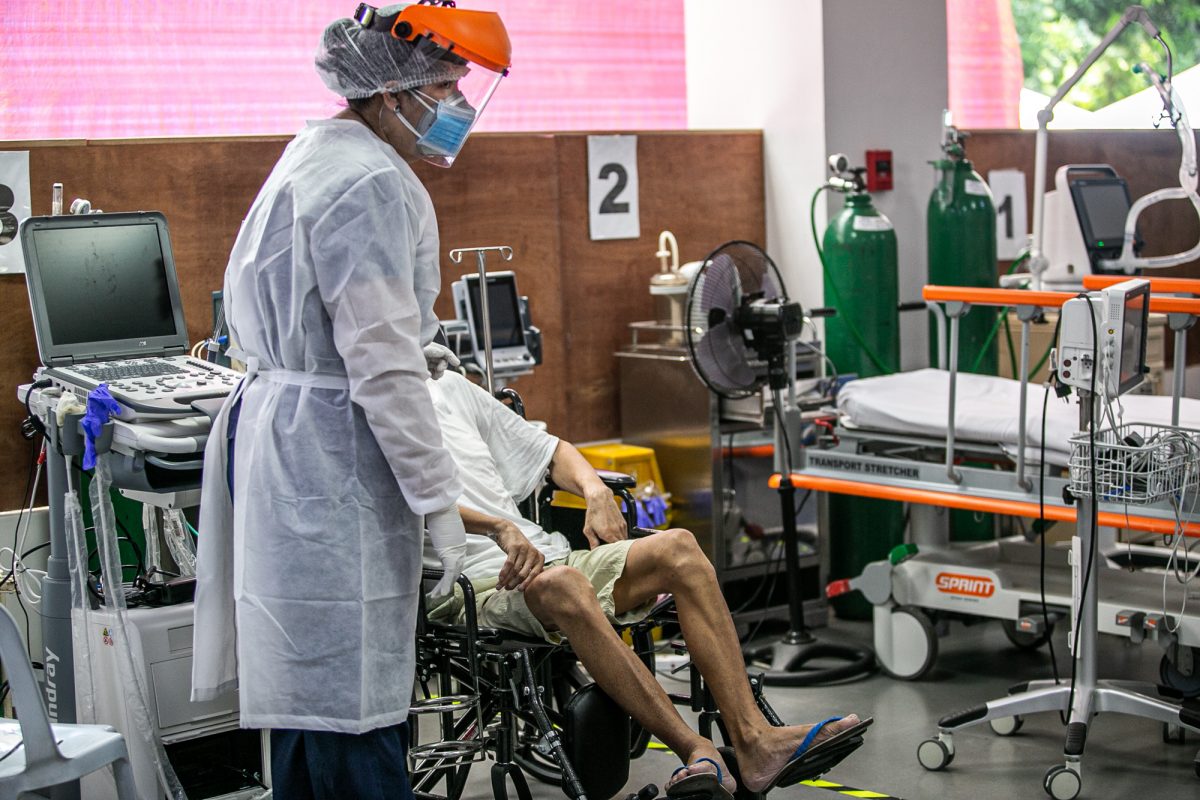Ghana's Mental Health System: Overburdened And Under-Resourced

Table of Contents
Insufficient Funding and Infrastructure for Mental Healthcare in Ghana
Ghana's mental health system suffers from a chronic lack of funding and inadequate infrastructure, severely limiting access to vital care for millions. This underinvestment manifests in several critical areas:
Limited Access to Mental Health Services
Geographical disparities significantly impact access to mental health services. Rural communities often lack adequate facilities and trained professionals, leaving many individuals without access to the care they need. This results in:
- Lack of hospitals and clinics specializing in mental health: Many regions rely on overburdened general hospitals with limited mental health capacity.
- Long distances to travel for treatment: The journey to access specialized care can be prohibitively long and expensive for individuals in remote areas.
- Limited transportation options for patients: Inadequate public transport networks further complicate access for those lacking private vehicles.
Shortage of Trained Mental Health Professionals
Ghana faces a critical shortage of psychiatrists, psychologists, nurses, and other mental health professionals. The high patient-to-provider ratio means long wait times, limited individual attention, and reduced quality of care. Contributing factors include:
- Brain drain of professionals to other countries: Better opportunities and higher salaries abroad entice qualified professionals to leave Ghana.
- Inadequate training programs for mental health professionals: The limited number of training programs and insufficient resources hinder the development of a robust workforce.
- Low salaries and poor working conditions deterring qualified individuals: The lack of competitive salaries and challenging working conditions make mental health professions less appealing to potential candidates.
Inadequate Infrastructure and Resources
Existing mental health facilities are frequently overcrowded, under-equipped, and in poor condition. This lack of adequate infrastructure and resources hampers effective service delivery:
- Overcrowded mental health wards: Overcrowding leads to compromised patient care and an increased risk of infection.
- Lack of modern diagnostic tools: The absence of essential diagnostic equipment hinders accurate diagnosis and treatment planning.
- Shortage of essential medications: Insufficient supply of necessary medications interrupts treatment and impacts patient outcomes.
- Poor physical conditions of existing facilities: Many facilities are dilapidated and lack basic amenities, creating an unwelcoming and unsuitable environment for patients.
Societal Stigma and its Impact on Seeking Help
The pervasive societal stigma surrounding mental illness significantly hinders help-seeking behavior in Ghana. This stigma stems from various factors:
Cultural Beliefs and Misconceptions
Traditional cultural beliefs and misconceptions often attribute mental illness to supernatural causes, leading to stigmatization and fear. This results in:
- Attribution of mental illness to supernatural causes: This belief often leads to reliance on traditional healers rather than seeking professional medical help.
- Stigma associated with seeking mental health treatment: Fear of social judgment and discrimination prevents many from seeking help.
- Fear of social isolation and discrimination: Individuals fear the potential consequences of disclosing their mental health condition.
Lack of Public Awareness and Education
Insufficient public awareness campaigns and educational programs perpetuate stigma and misconceptions. Addressing this requires:
- Increased media campaigns to destigmatize mental illness: Public awareness campaigns are crucial to challenge negative stereotypes and promote understanding.
- Mental health education in schools and communities: Integrating mental health education into school curriculums and community programs is vital for early intervention and prevention.
- Training for community leaders to address stigma: Empowering community leaders to educate and support individuals facing mental health challenges is critical.
Policy and Legislative Gaps in Ghana's Mental Health System
Ghana's mental health system also suffers from significant policy and legislative gaps. These shortcomings hinder effective service delivery and resource allocation.
Ineffective Mental Health Policies
Existing mental health policies and legislation often lack comprehensiveness, adequate funding, and robust enforcement mechanisms. This includes:
- Lack of a comprehensive national mental health policy: A clear, well-defined policy framework is crucial for guiding resource allocation and service delivery.
- Inadequate funding allocated to mental health in national budgets: Insufficient funding consistently undermines efforts to improve the system.
- Weak enforcement of existing mental health laws: Weak implementation of existing laws limits their impact on improving mental healthcare access.
Integration of Mental Healthcare into Primary Healthcare
Integrating mental health services into primary healthcare facilities is crucial for expanding access and facilitating early intervention. This necessitates:
- Training primary care physicians to identify and manage common mental health conditions: Equipping primary care providers with the necessary skills to identify and address mental health issues.
- Establishing mental health units within primary healthcare centers: Creating dedicated spaces within primary care settings to provide mental health services.
- Development of referral pathways between primary and specialized mental health services: Establishing clear pathways for referring patients to specialized care when needed.
Conclusion: Addressing the Challenges of Ghana's Mental Health System
Ghana's mental health system is undeniably overburdened and under-resourced. The combination of insufficient funding, inadequate infrastructure, societal stigma, and policy gaps creates a significant barrier to accessing crucial mental healthcare services. Addressing these challenges requires a multi-pronged approach involving increased investment, improved infrastructure, strengthened policies, and community engagement. We urgently need to advocate for Ghana mental health reform, focusing on improving Ghana's mental healthcare and ensuring accessible mental health services in Ghana for all. This requires collaborative efforts from the government, healthcare professionals, civil society organizations, and individuals. Let's work together to create a more supportive and inclusive environment for those struggling with mental health conditions in Ghana. Learn more about supporting mental health initiatives and advocate for policy changes that prioritize mental wellbeing.

Featured Posts
-
 Frimpong And Elliott Latest Liverpool Transfer Updates
May 03, 2025
Frimpong And Elliott Latest Liverpool Transfer Updates
May 03, 2025 -
 A Tribute To Poppy Atkinson From Manchester United And Bayern Munich
May 03, 2025
A Tribute To Poppy Atkinson From Manchester United And Bayern Munich
May 03, 2025 -
 Netanyahu Critique Macron Et La Grave Erreur De L Etat Palestinien
May 03, 2025
Netanyahu Critique Macron Et La Grave Erreur De L Etat Palestinien
May 03, 2025 -
 Mariya Zakharova O Semeynoy Zhizni Emmanuelya I Brizhit Makron
May 03, 2025
Mariya Zakharova O Semeynoy Zhizni Emmanuelya I Brizhit Makron
May 03, 2025 -
 Glastonbury Headliners 2024 Speculation On The 1975 And Olivia Rodrigo
May 03, 2025
Glastonbury Headliners 2024 Speculation On The 1975 And Olivia Rodrigo
May 03, 2025
Latest Posts
-
 Largest Heat Pump System In Europe A Collaboration Between Innomotics Eneco And Johnson Controls
May 04, 2025
Largest Heat Pump System In Europe A Collaboration Between Innomotics Eneco And Johnson Controls
May 04, 2025 -
 Stockage D Energie Eneco Inaugure Un Parc De Batteries Geant A Au Roeulx
May 04, 2025
Stockage D Energie Eneco Inaugure Un Parc De Batteries Geant A Au Roeulx
May 04, 2025 -
 Record Breaking Heat Pump System Launched By Innomotics Eneco And Johnson Controls
May 04, 2025
Record Breaking Heat Pump System Launched By Innomotics Eneco And Johnson Controls
May 04, 2025 -
 Au Roeulx Eneco Lance Le Plus Grand Projet De Stockage D Energie De Belgique
May 04, 2025
Au Roeulx Eneco Lance Le Plus Grand Projet De Stockage D Energie De Belgique
May 04, 2025 -
 Eneco Innomotics And Johnson Controls Partner For Gigantic Heat Pump Project
May 04, 2025
Eneco Innomotics And Johnson Controls Partner For Gigantic Heat Pump Project
May 04, 2025
